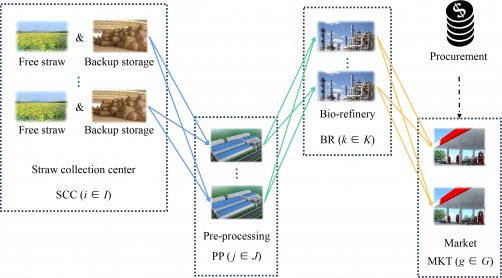Science
Researchers Develop Method to Enhance Biofuel Supply Chain Resilience

Researchers from Tianjin University have introduced a novel approach to enhance the resilience of biofuel supply chains. Their study, titled “Optimization design method for biofuel resilient supply chain considering node disruption impacts in a two-stage stochastic programming framework,” was published in the journal Frontiers of Chemical Science & Engineering, Volume 19, Issue 6. This research addresses the growing complexities and uncertainties faced by businesses in the biofuel sector.
As economic globalization accelerates, the biofuel supply chain has become increasingly intricate, exposing companies to heightened risks of disruptions. The ability to design resilient supply chains that can withstand these risks while ensuring security and competitiveness is a critical concern for enterprises. Traditional methods of supply chain design often fall short in quantifying and evaluating disruption risks, leaving significant gaps in effectiveness.
Innovative Solutions for Disruption Risks
To tackle these challenges, the researchers proposed an enhanced Node Disruption Impact Index. This index features adjustable parameters that reflect cost changes due to disruptions at various nodes within the supply chain. By identifying nodes with different risk levels, the index provides a valuable tool for evaluating the impact of potential disruptions.
The adjustable parameters allow supply chain enterprises to customize their assessments, facilitating a balance between economic benefits and resilience. The researchers further applied this index to analyze fluctuations in node uncertainties and developed a two-stage stochastic programming optimization model specifically for supply chains.
Case Study Demonstrates Effectiveness
This innovative model includes mechanisms to address potential high disruption risks. The team applied their findings to a specific biofuel supply chain case in Guangdong Province. The results indicated that when high-risk nodes experienced interruptions, the proposed model significantly outperformed traditional models in terms of cost efficiency and market delivery rate.
“This confirms the effectiveness of our method in optimizing resilient supply chains,” the researchers stated.
As the demand for biofuels continues to grow, the implications of this research could be substantial for businesses striving to maintain operational efficiency amid increasing uncertainties. The full paper detailing this study is available online for those interested in exploring the methodology and findings in greater depth.
-

 Technology5 months ago
Technology5 months agoDiscover the Top 10 Calorie Counting Apps of 2025
-

 Technology2 weeks ago
Technology2 weeks agoOpenAI to Implement Age Verification for ChatGPT by December 2025
-

 Health3 months ago
Health3 months agoBella Hadid Shares Health Update After Treatment for Lyme Disease
-

 Health3 months ago
Health3 months agoErin Bates Shares Recovery Update Following Sepsis Complications
-

 Health3 months ago
Health3 months agoAnalysts Project Stronger Growth for Apple’s iPhone 17 Lineup
-

 Technology5 months ago
Technology5 months agoDiscover How to Reverse Image Search Using ChatGPT Effortlessly
-

 Technology3 months ago
Technology3 months agoElectric Moto Influencer Surronster Arrested in Tijuana
-

 Technology2 months ago
Technology2 months agoDiscover 2025’s Top GPUs for Exceptional 4K Gaming Performance
-

 Technology5 months ago
Technology5 months agoMeta Initiates $60B AI Data Center Expansion, Starting in Ohio
-

 Technology5 months ago
Technology5 months agoRecovering a Suspended TikTok Account: A Step-by-Step Guide
-

 Health5 months ago
Health5 months agoTested: Rab Firewall Mountain Jacket Survives Harsh Conditions
-

 Lifestyle5 months ago
Lifestyle5 months agoBelton Family Reunites After Daughter Survives Hill Country Floods









